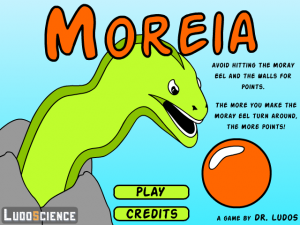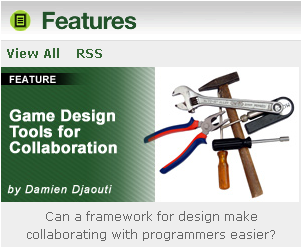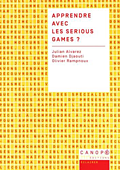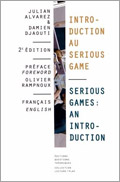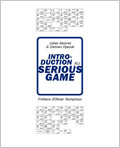LudoScience
Call for Papers: JCAL Special Issue on 'Learning Analytics in Massively Multiuser Virtual Environments and Courses' Damien Djaouti | 08-25-2013 | 12:14
CALL FOR PAPERS for a Special Issue of the Journal of Computer Assisted Learning (JCAL) on Learning Analytics in Massively Multiuser Virtual Environments and Courses
There has been much interest of late in ‘big data’ and the role it can play in decision making in diverse areas of business, science and entertainment. By employing a combination of modern artificial intelligence, machine learning and statistics techniques, extremely large and complex data sets can be ‘mined’ in a variety of ways to reveal relationships, patterns and insights not easily discoverable through standard database management tools and data processing applications. In the field of education, data mining approaches have been applied to the analysis of electronic ‘stores’ or repositories of student data for a number of years now (see Romero & Ventura 2005), but this has been occurring largely at the institutional or sector level. Such applications, which are sometimes referred to as ‘academic analytics’ (Campbell, DeBlois & Oblinger 2007; Goldstein & Katz 2005), have not become mainstream, being relevant mainly to governments, funding agencies and institutional administrators rather than students and teachers (Siemens et al. 2011).More recently, a new area of scholarship known as learning analytics (Long & Siemens 2011; Siemens et al. 2011) has emerged that seeks to generate knowledge ‘about learners and their contexts, for purposes of understanding and optimising learning and the environments in which it occurs’ (Siemens 2011, para. 5). This knowledge can be employed for a variety of purposes, among which are to allow learners to reflect on their activity and progress in relation to that of others as well as to assist teachers and support staff in predicting, identifying and supporting learners who may require additional attention and intervention (Powell & MacNeill 2012).
Occurring in parallel is the burgeoning trend towards the delivery of education and learning at a ‘massive’ scale. The last decade has seen an explosion of activity in the use of massively multiplayer online games (e.g. World of Warcraft) and virtual worlds (e.g. Second Life) for both formal and informal learning (see Childress & Braswell 2006; Dalgarno & Lee 2010). These massively multiuser virtual environments (MMVEs) are rife with opportunities for exploiting learning analytics methods to produce enhanced outcomes and experiences for students. At the same time, we have been witnessing a movement in which many universities and colleges, including some of the most prestigious institutions of higher learning in the world (e.g. Harvard, Stanford, MIT and the Universities of Melbourne, Toronto and Edinburgh, to name a few), are ‘opening up’ their course offerings to massive numbers of participants on the Internet (see, for example, Brown 2013; Daniel 2012; McAuley, Stewart, Siemens & Cormier 2013; Siemens, Irvine & Code 2013). In such massive open online courses (MOOCs), the involvement of hundreds, thousands or even tens of thousands of students creates a heighted imperative to devise alternative strategies for feedback and assessment that are less reliant on individual teachers. Learning analytics have the potential to be used in MOOCs to facilitate new models of self and peer assessment as well as to make possible the implementation of a range of automated mechanisms to support and augment students’ self-regulated learning goals and processes.
In recognition of the current interest in both learning analytics and massively multiuser environments and courses, contributions are being solicited for a special issue of JCAL addressing the intersection of these domains. It is clear that dialogue and exchange are needed to bring together the various contributory bodies of knowledge encompassed by the two domains, and one of the aims of the special issue will be to help encourage this. To this end, in addition to manuscripts reporting empirical investigations on the application of learning analytics to learning, teaching and assessment in MMVEs
and MOOCs, those with a theoretical or conceptual focus will also be considered, with interdisciplinary studies and perspectives particularly sought after and welcomed. However, manuscripts whose content is largely or entirely technical with little or no coverage of the pedagogical and/or instructional design-related aspects are unlikely to be included in the special issue. Moreover, case studies that are purely descriptive and do not contain substantive evaluation data, along with those that appear to promote particular products or platforms, will not be accepted.
Suggested Topics
Possible topics include but are not limited to the following:- Learning analytics for adaptation and personalisation in massively multiuser virtual environments and courses;
- Learning analytics for visualisation and recommendation in massively multiuser virtual environments and courses;
- Predictive modelling and forecasting of learner behaviour and/or achievement in massively multiuser virtual environments and courses;
- Design of intelligent tutoring systems specifically for use in massively multiuser virtual environments and courses;
- Dynamic scaffolding of learner activity (e.g. provision of diagnostic/formative assessment feedback) in massively multiuser virtual environments and courses;
- Enhancing motivational and other affective outcomes for students through learning analytics in massively multiuser virtual environments and courses;
- Using learning analytics to support cooperation, collaboration and/or competition among learners in massively multiuser virtual environments and courses;
- Application of social network analysis techniques to optimise learner interactions in massively multiuser virtual environments and courses;
- Strategies for analysing crowdsourced assessment and evaluation data in massively multiuser virtual environments and courses;
- Certification and credentialling (e.g. open badges) based on learning analytics in massively multiuser virtual environments and courses.
Key Dates
Proposal submission deadline: 30 September 2013Notification of proposal acceptance: 28 October 2013
Full manuscript submission deadline: 27 January 2014
Notification of full manuscript acceptance: 26 May 2014
Final manuscripts due: 21 July 2014
Expected publication date: Late 2014
Submission and Review Process
Prospective authors intending to submit manuscripts for the special issue are asked to supply a 500-word extended abstract outlining the content and aims of the proposed article, plus a list of 7 to 10 key references that the article will be informed by and/or draw/build upon. This is to be done by completing the online form at http://goo.gl/nHF272 . The editorial team will review the proposals and identify approximately 10 that would be suitable to be developed into full manuscripts.
Full manuscripts should be prepared in accordance with the JCAL Author Guidelines and submitted via the journal’s ScholarOne Manuscripts system. Manuscripts for the special issue are to be between 4,000 and 6,000 words in length. (Please note that the word count is all-inclusive of the title, author details, abstract, keywords and reference list as well as any tables and appendices that the manuscript may contain.)
Manuscripts must be original and must not have been previously published nor be under consideration for publication elsewhere at the time of submission to JCAL and throughout the duration of the review process. Each full manuscript will be subjected to double-blind peer review. It is envisaged that 6 or 7 articles will ultimately be published in the special issue.
Queries and requests for further information may be directed to the editor-in-charge of special issues for JCAL, Mark J.W. Lee, at jcal.specialissues@gmail.com.
References
- Brown J., ed. (2013) Special issue on MOOCs and technology. Research and Practice in Assessment 8. Available at: http://www.rpajournal.com/dev/wp-content/uploads/2013/05/Vol8_Summer.pdf
- Campbell J.P., DeBlois P.B. & Oblinger D. (2007) Academic analytics: a new tool for a new era. EDUCAUSE Review 42, 41–57. Available at: http://www.educause.edu/ero/article/academic-analytics-new-tool-new-era
- Childress M.D. & Braswell R. (2006) Using massively multiplayer online role-playing games for online learning. Distance Education 27, 187–196.
- Dalgarno B. & Lee M.J.W. (2010) What are the learning affordances of 3-D virtual environments? British Journal of Educational Technology 40, 10–32.
- Daniel J. (2012) Making sense of MOOCs: musings in a maze of myth, paradox and possibility. Journal of Interactive Media in Education 3. Available at: http://jime.open.ac.uk/article/2012-18/
- Goldstein P.J. & Katz R.N. (2005) Academic Analytics: The Uses of Management Information and Technology in Higher Education. EDUCAUSE, Boulder, CO. Available at: http://www.educause.edu/ir/library/pdf/ers0508/rs/ers0508w.pdf
- Long P. & Siemens G. (2011) Penetrating the fog: analytics in learning and education. EDUCAUSE Review 46, 31–40. Available at: http://www.educause.edu/ero/article/penetrating-fog-analytics-learning-and-education
- McAuley A., Stewart B., Siemens G. & Cormier D. (2010) The MOOC Model for Digital Practice. University of Prince Edward Island, Charlottetown, PE. Available at: http://www.elearnspace.org/ Articles/MOOC_Final.pdf
- Powell S. & MacNeill S. (2012) Institutional Readiness for Analytics. University of Bolton, Bolton, UK. Available at: http://publications.cetis.ac.uk/wp-content/uploads/2012/12/Institutional-Readiness-for-Analytics-Vol1-No8.pdf
- Romero C. & Ventura S. (2007) Educational data mining: a survey from 1995 to 2005. Expert Systems with Applications 33, 135–146.
- Siemens G. (2011) Call for Papers for the First International Conference on Learning Analytics and Knowledge (LAK’11). Available at: https://tekri.athabascau.ca/analytics/
- Siemens G., Irvine V. & Code J., eds (2013) Special issue on massive open online courses. MERLOT Journal of Online Learning and Teaching 9, 2. Available at: http://jolt.merlot.org/Vol9_No2.htm
- Siemens G., Gaševiæ D., Haythornthwaite C., Dawson S., Shum S.B., Ferguson R. Duval E., Verbert K. & Baker R.S.J.d. (2011) Open Learning Analytics: An Integrated and Modularized Platform. Society for Learning Analytics Research. Available at: http://www.solaresearch.org/ OpenLearningAnalytics.pdf
Leave a comment | Category : Conferences, | Keywords : call for papers, journal,
New website section: games created by Ludoscience! Ludoscience | 08-16-2013 | 12:21
As the summer goes, a new section appears on this website: games made at the Ludoscience laboratory!
This new section will let you play the various videogames created by the members of the laboratory during their research projects. Hence, this new section is different from our reseach projects section (that gathers research projects that are not games, or games that are not available to the general public) and from our students projects section (that solely gathers games created by the students who attends to our lessons). This new section will then gathers games that you can freely play online or download.
In order to launch this new section, we present you a small arcade game created by Dr. Ludos, a new member of the laboratory. As a game designer, he will mainly focus on creating experimental videogames.
His first videogame, Moreia, is a quick mouse-based dexterity game. You are being chased by a giant moray eel, and you must escape it for as long as possible, while avoiding to hit the walls around the screen. Click here to play this Flash game on our website.
BTW, the highscore among Ludoscience members is 4200 points, for now! ;)
Leave a comment | Category : Misc., | Keywords : website updates, videogames,
SeGaMed 2013 : Sept 12-14 Nice, FR - Call for papers Ludoscience | 07-08-2013 | 16:47
SeGaMed 2013: Sept 12-14 Nice, FR
Call for proposals A renewal 2013 edition ...
This year, two major innovations: the embedding of SeGaMed as a conference of the first "Journées de l'Enseignement Universitaire par le Numérique en Santé" (the 'JEUNS) and the organisation of a master class "gamification in healthcare", animated by a panel of French and international experts.
Leave a comment | Category : Conferences, | Keywords : Serious game, Health, Health game,
Serious Games: an introduction, now available as eBook! Ludoscience | 06-29-2013 | 15:02
Enjoy!
Leave a comment | Category : Reading, | Keywords : Serious game, Serious Gaming, Serious Play, eBook, Health, Learning, Market, Communication,
An article on Gamasutra about Game Design tools Damien Djaouti | 03-12-2013 | 16:12
The famous website Gamasutra has just published one of our article about the potential use of Game Design tools to help designers and programmers communicate within a game development studio. You can read it online:
Leave a comment | Category : Game Design, | Keywords : game design tools, industry,
About
This website gathers ours thoughts, our projects, our publications and many pedagogical resources related to the various types of videogames:
Blog categories
Our books
Follow us
Our last tweets
Videogaming links
-
http://bnf.libguides.com/jeux-serieux
- AFJV News
- (BNF) French National Library Serious Games
- Genious Serious Games
- Succubus Serious Games
- SGBelgique Serious Games
- AcCréteil Serious Games
- 1984 Advergames
- Ex-Vid Studies
- Playtime Studies
- Pix'N Love Books
- Console Syndrome Studies & Books
- Olivier Mauco Studies
- Alexis Blanchet Studies
- TIGSource Indies News
- IndieGames Indies News
 Français
Français English
English
